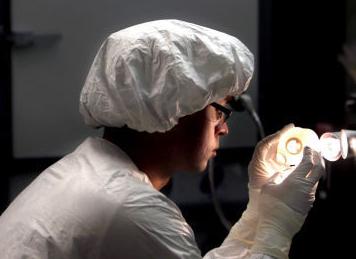A private equity firm said it has completed its purchase of Tucson-based artificial heart maker SynCardia Systems in a bankruptcy sale and pledged to back the company’s growth.
An affiliate of Philadephia-based Versa Capital Management LLC said SynCardia will continue to be headquartered in Tucson and led by President and CEO Michael P. Garippa. SynCardia employed about 100 people as of last year.
“The partnership with Versa provides SynCardia the resources to continue providing physicians and their patients globally with the life-saving Total Artificial Heart,” Garippa said, in the company’s first public statements since a U.S. bankruptcy judge approved a Chapter 11 bankruptcy sale of SynCardia’s assets to the Versa affiliate last week.
SynCardia, which proposed the sale to Versa when it filed for Chapter 11 bankruptcy protection in July, is maker of the only total artificial heart approved for use as a bridge to transplant in the U.S., Canada and Europe.
“There is greater financial and operational support to grow and flourish nationally and internationally, and to continue development of new and innovative devices,” Garippa said, noting that a smaller, 50cc heart under development is designed to accommodate underserved populations, including women and adolescents.
Gregory L. Segall, chairman and CEO of Versa, said SynCardia is unrivaled in the worldwide artificial heart market, and that Versa will help the company grow.
Besides developing the smaller artificial heart, SynCardia is working on an improved version of its portable pneumatic heart driver and is trying to win approval for use of its heart as a long-term “destination therapy” for patients who are not candidates for transplants.
“SynCardia now has the capital and other resources necessary to realize its full potential, including development of the next generation Freedom driver, advancing use outside of the hospital and accelerating their growth trajectory here in the United States and around the world,” Segall said.
Versa specializes in buying and recapitalizing troubled companies. Its portfolio of turnaround projects includes retailers the Wet Seal, Avenue Stores and Black Angus Steakhouses and manufacturers Bell and Howell and Polartec.
Though SynCardia has found new capital, it still faces some of the same obstacles to wider adoption of its hearts, including high costs and a relatively limited market, an industry observer said.
“Everything boils down to cost, and at the end of the day if it costs 10 times more to implant a SynCardia device than other products on the market, then SynCardia will be at a disadvantage,” said Dave Fornell, editor of the industry journal Diagnostic and Interventional Cardiology.
SynCardia’s total artificial heart costs about $125,000, plus about $20,000 a year for use and maintenance of portable drivers. Medicare started covering the cost in 2008 and some private insurers also cover it.
So-called ventricular-assist devices, a competing technology that typically boosts the function of one heart ventricle, can cost more than $100,000, not including hospitalization.
Fornell said the cost is one of the main reasons SynCardia is serving only a fraction of the patient population.
SynCardia cites more than 1,635 implants of the SynCardia Total Artificial Heart and says that since 2012, SynCardia has averaged 141 implants of its hearts annually.
But Fornell noted that some 4,000 people in the U.S. alone are awaiting heart transplants.
Development of the smaller, 50cc heart and approval as a destination therapy could widen the market for SynCardia’s artificial hearts, Fornell said, but even then, cost could restrict its widespread adoption.





